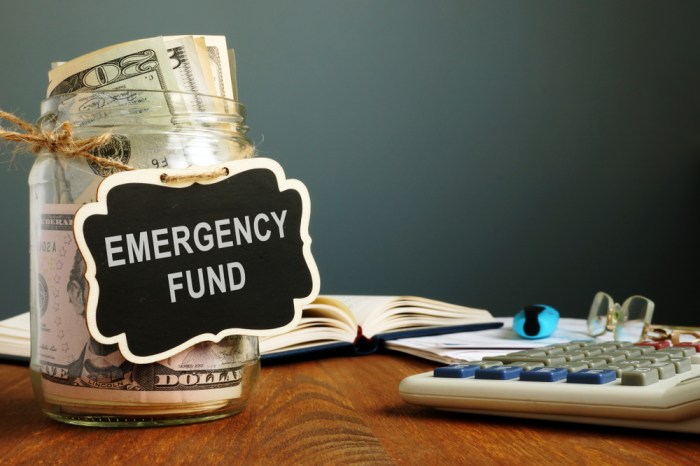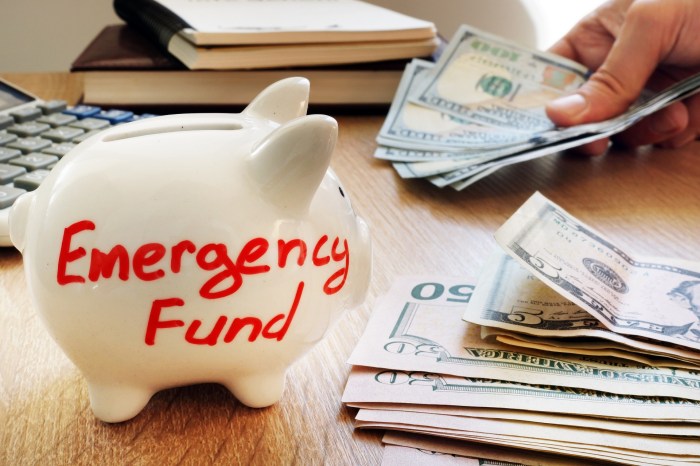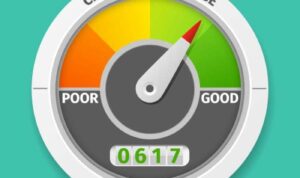Emergency funds are like the MVP of your financial game – crucial, life-saving, and necessary. Let’s dive into how to build, use, and grow them like a pro!
When unexpected financial challenges come knocking, having a solid emergency fund can be your saving grace.
Importance of Emergency Funds
Having emergency funds is crucial for financial stability as it provides a safety net during unexpected situations that may arise.
Examples of Unexpected Situations
- Medical emergencies: Unexpected medical bills can put a strain on finances, but having emergency funds can help cover these expenses.
- Car repairs: When your car breaks down unexpectedly, having funds set aside can prevent this from derailing your budget.
- Job loss: In case of sudden unemployment, emergency funds can cover living expenses until a new job is secured.
Recommended Amount for Emergency Funds
Financial experts recommend having at least 3 to 6 months’ worth of living expenses saved in an emergency fund. This amount can vary based on individual circumstances, such as income stability and family size.
Building Emergency Funds

Building emergency funds from scratch can seem overwhelming, but with the right strategies and mindset, it is achievable. Here are some tips to help you get started and grow your emergency savings over time.
Starting Small and Consistent, Emergency funds
- Set a realistic savings goal: Start by saving a small amount each month, even if it’s just $25 or $50. Consistency is key.
- Automate your savings: Set up automatic transfers from your checking account to your emergency fund to ensure you save regularly.
- Track your expenses: Keeping track of your spending can help you identify areas where you can cut back and redirect that money towards your emergency fund.
Different Saving Strategies
- Side hustles: Consider taking on a side gig or freelance work to earn extra income specifically for your emergency fund.
- Budget cuts: Review your budget and identify non-essential expenses that you can reduce or eliminate to free up more money for savings.
- Saving windfalls: Whenever you receive unexpected money like a tax refund or bonus, put a portion of it into your emergency fund.
Best Practices for Maintenance
- Regularly reassess your savings goal: As your financial situation changes, adjust your emergency fund target accordingly.
- Keep your emergency fund separate: Maintain a separate account for your emergency fund to avoid the temptation of dipping into it for non-emergencies.
- Replenish after use: If you ever need to dip into your emergency fund, make sure to replenish the withdrawn amount as soon as possible.
Using Emergency Funds Wisely

In times of financial emergencies, it is crucial to know when and how to utilize your emergency funds effectively. Let’s explore the best practices for using emergency funds wisely.
Situations to Dip into Emergency Funds
- Unexpected medical expenses that are not covered by insurance.
- Car repairs or home maintenance emergencies that cannot be delayed.
- Loss of income due to job loss or reduction in work hours.
Importance of Replenishing Emergency Funds
- Replenishing emergency funds ensures that you are prepared for future financial emergencies.
- It helps maintain financial stability and peace of mind knowing you have a safety net.
- Regularly contributing to your emergency fund can help you avoid accumulating high-interest debt in emergencies.
Strategic Use of Emergency Funds
- Using emergency funds to cover unexpected expenses can prevent you from going into debt.
- Strategically utilizing emergency funds can help you avoid financial crises and maintain financial independence.
- For example, having emergency funds saved up can help you navigate through periods of unemployment without stressing about finances.





